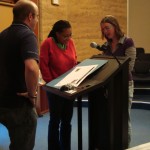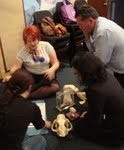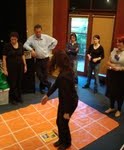Wonder what science communication researchers do? Come to this informal round table and find out. And enjoy some good company as we celebrate another successful semester.
End of Year Wrap
UWA Science Communication is made up of people from different science backgrounds. From physical sciences, environmental sciences, neurosciences just to name a few. It makes for a rich and talented group with immense depth.
Come hear about the following:
Caris Allen is seeking answers to questions like: ‘Do farmers read blogs? Are podcasts popular with farmers? Do farmers text?’ as part of her literature review as part of Science Communication Specialist Research Topics (COMM7402).
PhD Candidate Miriam Sullivan is working on framing messages about animal welfare.
PhD candidate Muza Gondwe is preparing her research proposal on the use of digital story telling in connecting cultural knowledge and western science.
PhD candidate Sophia Bickford is sending out a survey to high school science teachers asking them about their experiences and expectations of excursions and incursions.
Honours student Jessie Roxby is preparing her online survey for citizen scientists.
Research Assistant Professor Colin Hanbury is interviewing scientists about factors that affected their career decisions.
Other activities: There are students in UWA Science Communication planning trips during the summer break to practice what they have learned in the real world. There are even whispers of a science film being made!
At this session, we’ll decide on a science book to read over the summer for our first semester book club. Got a suggestion?
Where: Centre for Learning Technology
http://www.clt.uwa.edu.au/contact
When: 29th, October 2010, 4:00PM – 5:00PM
Drinks and nibbles provided
_______________________________________________ ASC-list mailing list list@asc.asn.au http://www.asc.asn.au/index.php?option=com_content&task=view&id=97&Itemid=115




